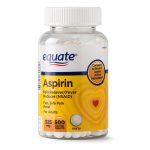- Type of Drug: Analgesic combination.
- Prescribed for: Pain from muscle spasms, sprains, strains; or bad backs.
General Information
Equagesic is one of several combination products containing a tranquilizer and an analgesic; it is used to relieve pain associated with muscle spasms. The Meprobamate in this product opens it to many drug interactions, especially with other tranquilizers or depressant drugs, which can lead to habituation and possible drug dependence. These combinations may be effective in providing temporary relief from pain and muscle spasm. Follow all of your doctor’s instructions to help treat the basic problem.
Cautions and Warnings
Do not take this combination if you are allergic to any of its ingredients or to other salicylates or Carisoprodol.
Aspirin can worsen kidney function in people who already have a kidney condition, and Meprobamate should be used with caution by people with liver or kidney disease. Aspirin can irritate your stomach and should be avoided by/people with gastritis or ulcers. Also, Aspirin should be used with caution by people with mild diabetes or bleeding tendencies.
People taking Meprobamate may become dependent on it. Avoid using this product for more than a few weeks at a time. Abruptly stopping this medicine can lead to drug Withdrawal (anxiety, appetite loss, insomnia, vomiting, tremors, muscle weakness or twitching, confusion, and hallucinations) or recurrence of symptoms. The dose should be gradually reduced over a period of 1 to 2 weeks.
Possible Side Effects
- Most common: nausea, vomiting, stomach upset, dizziness, and drowsiness.
- Less common: allergy, itching, rash, fever, swelling in the arms and/o r legs, occasion at fa inti ng spells, and bronchial spasms leading to difficulty breathing.
- Rare: changes in blood components and blurred vision.
Drug Interactions
• The Meprobamate in these products can cause sleepiness, drowsiness, or difficulty breathing (in high doses). Avoid taking them with other nervous-system depressants, including alcohol, barbiturates, narcotics, sleeping pills, tranquilizers, and some antihistamines.
• If you are taking an anticoagulant (blood-thinning medication) and have been given a new prescription for one of these combination products, be sure that your doctor knows they contain Aspirin. Aspirin affects the ability of your blood to clot and can necessitate a change in the dose of your anticoagulant.
Food Interactions
These drugs may be taken with food if they upset your stomach.
Usual Dose
1 or 2 tablets 3 to 4 times per day.
Overdosage
Overdoses are serious. Symptoms are drowsiness, lightheadedness, desire to go to sleep, nausea, and vomiting. Victims should be taken to a hospital emergency room immediately. ALWAYS bring the medicine bottle.
Special Information
Be careful when driving or performing complex tasks While taking one of these products.
Call your doctor if drug side effects become bothersome or persistent. If you forget to take a dose of one of these combinations, take it as soon as you remember. If it is almost time for your next dose, skip the one you forgot and continue with your regular schedule. Do not take a double dose.
Special Populations
Pregnancy/Breast-feeding
These drugs cross into the fetal blood circulation. They have not caused birth defects, although Meprobamate has been known to increase the chance of birth defects if taken during the first 3 months of pregnancy. When such a drug is considered essential by your doctor, its potential benefits must be carefully weighed against its risks.
These drugs pass into breast milk. Nursing mothers taking this product should consider bottle-feeding their babies.
Seniors
Older adults are more sensitive to the effects of these combination products, especially drowsiness or sleepiness.

